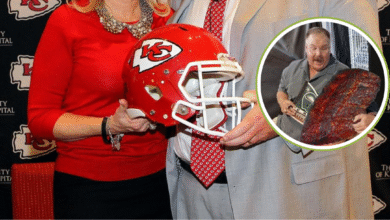Inside the Epidural That Changed Everything: Fletcher Cox’s Painful Goodbye to the NFL
OPINION: This article may contain commentary which reflects the author's opinion.
For over a decade, Fletcher Cox was the heartbeat of the Philadelphia Eagles’ defensive line. A six-time Pro Bowler, Super Bowl champion, and one of the most durable players in franchise history, Cox’s presence on the field was as commanding as his legacy off it. But in 2023, a single medical procedure—an epidural injection to alleviate persistent back pain—marked the beginning of the end for the NFL star. This is the story of how that moment reshaped Cox’s career, forced him to confront his physical limits, and ultimately led to his emotional retirement from the game he loved.
The Injury That Shifted the Tide
In the early weeks of the 2023 NFL season, Cox, then 32, began experiencing nagging discomfort in his back. The pain wasn’t new to him; Cox had played through countless injuries during his 12-year career, missing only a handful of games since being drafted 12th overall in 2012. But this time, the discomfort lingered, affecting his ability to perform at the elite level he’d maintained for over a decade. By Week 5, with the Eagles preparing to face the Los Angeles Rams, Cox’s condition had worsened.
According to reports from NFL Network’s Ian Rapoport, Cox underwent an epidural injection to address the back pain that had plagued him for weeks. The procedure, intended to reduce inflammation and provide relief, was a common one for athletes dealing with spinal issues. However, it came with a cost: Cox was ruled out for the Eagles’ Week 5 matchup against the Rams, a rare absence for a player known for his ironman durability. The expectation was that he’d miss no more than one game, but the epidural marked a turning point in Cox’s physical and mental battle with the toll of professional football.

A Career Defined by Resilience
To understand the significance of this moment, one must look at Cox’s remarkable career. Over 12 seasons, he played in 200 games, starting 182 in the regular season and 12 in the postseason. He racked up 70 sacks, 16 forced fumbles, and three fumble-return touchdowns, earning a spot on the NFL’s 2010s All-Decade Team. His contributions were pivotal in the Eagles’ Super Bowl LII victory over the New England Patriots in 2018, cementing his status as a franchise legend. Off the field, Cox was a leader, a mentor to younger players like Jalen Carter and Jordan Davis, and a beloved figure in Philadelphia.
Cox’s durability was his hallmark. “Me, normally, I don’t miss games, I don’t miss practices,” he said in a 2024 interview on The Rich Eisen Show. But the 2023 season tested that resilience. In addition to the back injury, Cox suffered a groin injury later that year against the Buffalo Bills, further limiting his availability. While he returned to play in 15 games that season, recording five sacks and a forced fumble, the physical toll was evident. The epidural, though a temporary fix, highlighted a harsh reality: Cox’s body was no longer invincible.
The Emotional Weight of Retirement
By March 2024, Cox made the decision to retire. In a heartfelt social media post, he announced, “I gave everything I had to this team and to this city.” Speaking to The Rich Eisen Show, Cox elaborated on his choice, explaining that the physical grind of the NFL had begun to outweigh his passion for the game. “Sometimes, I found myself asking myself, ‘Why?’ And I always told myself, whenever I feel that way, I know it’s time,” he said. The back injury and epidural, while not the sole reasons for his retirement, were pivotal in forcing Cox to confront his mortality as an athlete.
The decision wasn’t easy. Cox admitted to feeling conflicted, knowing he could still play at a high level despite not being the Pro Bowl force of his prime. Yet, the prospect of continuing to push through pain, coupled with the mental fatigue of recovery, led him to walk away. “I kind of felt like I would be lying to myself if I told myself that I could continue to do it at a high level,” he said. His retirement came less than two weeks after teammate Jason Kelce’s, marking the end of an era for the Eagles.
Life After Football
Cox’s retirement press conference on April 9, 2024, at the Eagles’ NovaCare Complex was an emotional farewell. He thanked his family, coaches, teammates, and fans, reflecting on a career that included a Super Bowl ring and a legacy as the most accomplished defensive tackle in Eagles history. A video montage of messages from teammates and coaches moved Cox to tears, underscoring the impact he’d had on those around him.
Looking ahead, Cox plans to split his time between Philadelphia and his 1,500-acre farm in Texas, Shady Trell Ranch. He’s ruled out a midseason return to the NFL, stating, “When I’m done with something, I’m done with it.” For Cox, the epidural in 2023 wasn’t just a medical procedure—it was a wake-up call that his body could no longer keep pace with his will. His goodbye to the NFL was painful, but it was also a testament to his self-awareness and courage to step away on his own terms.
A Legacy That Endures
Fletcher Cox’s retirement closes a chapter in Eagles history, but his influence endures. Young defensive tackles like Carter and Davis, who played alongside him, carry forward the lessons of leadership and tenacity he imparted. For fans, Cox remains a symbol of Philadelphia’s grit and heart. The epidural that changed everything may have signaled the end, but it also highlighted the extraordinary resilience of a player who gave everything to the game—until his body told him it was time to let go.



